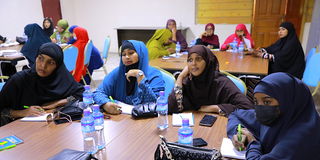Somali trade unions rally for better working conditions for women

Somali women entrepreneurs attend a seminar on labour rights in Mogadishu.
Somalia’s trade unions are rallying for better working conditions for women in the latest push to break through the long-held cultural barriers.
The admission for freer environment for both women and men came on Thursday June 23, in a statement summing the end of a three-day event to discuss labour relations along gender lines on June 21. And most of the trade union representatives gathered in Mogadishu admitted the country’s entrepreneurship, for instance, has been held back because only men have a free hand to try it.
They argued that allowing women freedom to try out entrepreneurship could bring Somalia overall benefits that will include better contribution to the economy.
The workshop, funded by the Embassy of Sweden and supported by the International Labour Organisation, is part of growing efforts to have labour unions under the Federation of Somali Trade Unions (FESTU) vouch for more working spaces and freedom for women, as the country rises from years of violence.
Per Lindgärde, the Swedish Ambassador to Somalia, said Somalia has no choice but to free up the space if at all it needs to tap into the economic potential of women in the country.
“That potential will always be limited if the workforce is not inclusive,” Mr Lindgärde said.
His country is among the best places to work for women and the country’s government is headed by Prime Minister Magdalena Andersson.
The country’s lessons, the envoy argued, could be brought to Somalia for its own progress.
“Women entrepreneurs already dominate the informal sector of the Somali economy. Enabling them to become part of the formal economic sector will be of great benefit to the Somali economy. We are glad to support this initiative of the Somali trade unions,” Mr Lindgärde said.
At least 35 trade union representatives gathered in Mogadishu for the meeting, including women entrepreneurs and those in the informal economy.
For Somalia, the challenges for better working environment is historical. The country faces problems advocating for women’s rights, their protection from harmful policies at work and being side-lined from decision making.
Besides, violence, sexual harassment and being overlooked for promotion were listed among the challenges, during the meeting.
That will require everyone’s hand to eliminate them, officials said.
“Trade unions must promote gender equality in the workplace and challenge stereotypical and harmful perceptions of women, their capabilities and potential in the labour market. As trade unions, we must actively promote the notion and practice of female leadership,” said Omar Faruk Osman, Secretary-General of FESTU.
“This means an end goal of women receiving equal pay for work of equal value, advocating for progressive working conditions steeped in equal access, fair work-life balance, and addressing the pervasiveness of gender-based violence at work,” he emphasized.
In Somalia, women have always played a pivotal role in sustaining families and protecting livelihoods, FESTU says. But their social contributions are only to an extent permitted by age-old cultural barriers.
The workshop was meant to discuss how to break these barriers. Which participants say have been created by “conscious and semi-conscious gender and cultural biases that still persist in politics and the labour market.”
ILO’s Director for the Horn of Africa region Alexio Musindo said trade unions like FESTU must promote gender equality by challenging the status quo of gender inequalities in the formal and the informal employment.
“At ILO, we strongly believe that women’s empowerment is a precondition for a just, sustainable and rights-based Somali economy.
“However, the situation in the country gives a different picture with women disproportionately affected by poverty, over-representation in insecure and low wage jobs and are victims of discrimination and abuse in the workplace and exploitation.”





